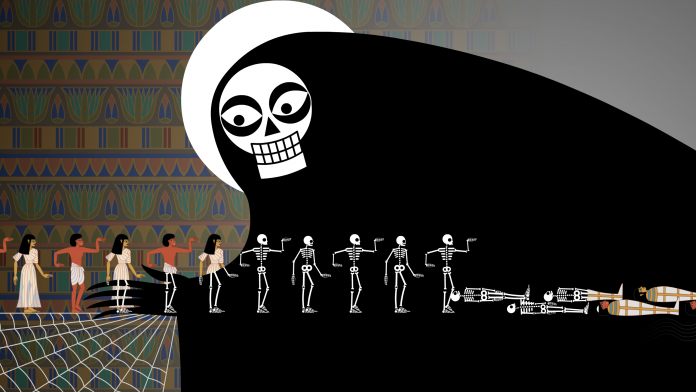(THIS ARTICLE IS MACHINE TRANSLATED by Google from Norwegian)
"And now on to something completely different." I started with this Monty Python quote even when I wrote about Boots Riley's movie a few months ago Sorry to Bother You, but it is equally relevant to use Nina Paley's animated musical Seder-Masochism. Both because the film is very refreshing and different, and because the legendary British comedy group – and especially the feature film Life of Brian – experienced as a natural reference.
Playful retelling
Animator, director, screenwriter and producer Paley (she also has a number of other features!) Here follows her ten year old full-time animated film Sita Sings the Blues, which was a playful and imaginative adaptation of the ancient Indian heroic poem Ramayana. In the film, this epic story of the Hindu gods Sita and Rama was recounted, among other things, by the memory of three modern Indians, with all that entailed disagreements, inaccuracies and digressions. Typical of Paley's many creative inventions, they gave three voices to each their animated shadow puppet. This movie was also a kind of musical, where heroine Sita in Betty Boop-like animated version sang her emotions in the form of jazz singer Annette Hanshaw's recordings from the 20s. In addition, the film told a parallel contemporary story based on the American filmmaker's own experiences from when her husband got a "temporary" job in India, which should not necessarily have a happy outcome for their relationship.
controversial
Sita Sings the Blues won numerous awards at film festivals around the world, but also created controversy – such humor based on religious conceptions has to do. This despite the film's sharpest streak being of a more feminist nature and not a direct criticism of Hinduism per se. But there were also those who responded more generally to Paley's unspoken indigenous gaze on Indian culture. "How would you like it if someone made a movie about your own religion?" Was supposedly the mantra.
In its whimsical simplicity, the animations occasionally appear as small visual arts experiences.
With Seder-Masochism she has done just that. The film is based on the biblical accounts of passover customs (the liberation of the Jews from Egypt) and recount, among other things, the story of how Moses led his people out of Egypt. Again, Paley uses loosely and inventively various animation techniques (including dancing variants of archaeological figures), which in their quirky simplicity sometimes appear as small visual arts experiences in themselves. This time too, the story is told in musical form, but with a far more eclectic selection of songs. Here you can hear artists like Gloria Gaynor, Herb Alpert, The Four Tops, John Lennon, 10cc, Louis Armstrong and Guns N 'Roses – to name a few. In this context, it should be mentioned that Paley had problems with the copyright of the Hanshaw recordings after the first feature film. She may have made legal claims to several such cuts with Seder Masochism, but she herself defends the use of music in the film by referring to the right to use copyrighted works in parodies.

The sequence depicting the ten country plagues accompanied by each humorously appropriate song should be highlighted as one of the absolute highlights of the film. The same is the sequence "This Land is Mine", in which Andy Williams' version of the prelude with the same title constitutes the soundtrack to an effective review of the various peoples who in turn slaughtered each other to claim the presumably holy land. This was one of several "web episodes" released earlier on the web, and works superbly as a standalone short film – but also does well as a climax in the feature film.
The almighty father
Seder Masochism also contains elements from the filmmaker's own life. Specifically, some very charming conversations between Paley and her now deceased father, discussing the religion they both have a reasonably secular relationship with. In these scenes, the father has taken the form of the Almighty God, while Nina herself is a small sacrificial goat.

The film has been shown at a number of festivals, including Fredrikstad Animation Festival and Tromsø International Film Festival here in Norway. Instead of distributing the film commercially, Paley – who describes himself as a champion of "Free Culture" – made the film available for free streaming and downloading online. She did the same a few years ago Sita Sings the Blues. She even claims that the more people watched the first movie online, the more they went to the cinema and festivals – contradicting the industry's misguided assumptions about free content available online.
Seder-Masochism is an original and exceptionally enjoyable film that in no way lacks critical content – not least when it comes to the patriarchal aspects of Judaism. This animated musical was a very positive surprise for me, as it was also to discover that both it and Sita Sings the Blues are freely available at just a few keystrokes.
Seder Masochism is freely available at www.sedermasochism.com
The movie is shown below Oslo Pix 3-9.juni
Sita Sings the Blues on www.sitasingstheblues.com


